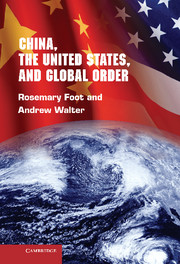5 - Climate Change
Published online by Cambridge University Press: 05 June 2012
Summary
This issue speaks to several of our main concerns about the concept and nature of global order. First, climate change – a more accurate and encompassing term than “global warming” – transcends state borders and affects every state in the global system, but it is not easily addressed through a governance framework that rests on a pluralist state-based notion of global order (Hurrell 2007: 118). Second, and related to this, responses to climate change have brought into being complex governance structures involving international organizations, environmental and other NGOs, scientific communities, and businesses that have often worked at cross-purposes and thereby elevated the difficulties of formulating a robust climate protection norm. Third, the US and Chinese positions have been significantly influenced by the stances that each has taken towards climate change negotiations. Both governments have been reluctant to play a substantive role in deepening and strengthening this norm unless the other accepts that it too must play its part. Finally, at the global level, the United States and China are at the heart of the problem: they are the world’s largest energy consumers and the two largest producers of greenhouse gases (GHG), currently accounting together for over 40 percent of all global emissions of such gases (Lieberthal and Sandalow 2009: 1). This is dramatically complicated by the fact that China’s annual emissions are growing much more rapidly and because of the large asymmetry in their historic contributions to the atmospheric stock of GHG (Hallding, Han, and Olsson 2009: 24; Pew Center/Asia Society 2009: 18).
The global normative framework for climate protection has distinctive features that have rendered its creation and elaboration particularly problematic, and five, in particular, have made the norm subject to high levels of contestation. First, and unlike some of the other global norms that we investigate in this book, it has high domestic significance and poses a direct challenge to domestic ways of life – including individual and societal decisions about resource use and general expectations of further material improvement. Second, the norm is asymmetric, requiring much of the advanced countries – because of their historical contribution to the problem and stronger capacity to mitigate or adapt to the effects of climate change – and rather little of those formally designated as developing countries, which are often still focused on the alleviation of poverty. This is not a norm that has been dominated in its creation and elaboration entirely by the world’s most advanced economies. Third, the levels of acceptance of the norm have been more severely tested over time as it has come to take on a number of specific features that have raised questions about its overall coherence and fairness. Fourth, the United States and China have emerged as being at the heart of this issue and their own relationship has become bound up tightly in it. They are now generally recognized as crucial to a core feature of the norm that affects its ability to be consolidated: the specific content of a common but differentiated responsibility in addressing climate change. Finally, it has taken years to establish a scientific consensus on climate change based on acceptance of its largely anthropogenic origins (and this consensus remains under challenge). This, too, has restrained the progress of the norm and provided greater space and time for these deeper, value-laden contestations to work their way through both domestic and international negotiating forums.
- Type
- Chapter
- Information
- China, the United States, and Global Order , pp. 175 - 228Publisher: Cambridge University PressPrint publication year: 2010
- 1
- Cited by



